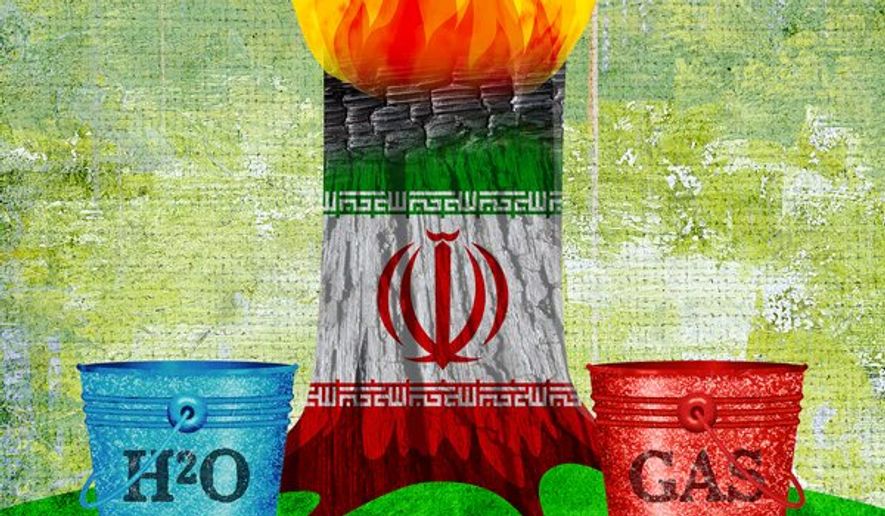OPINION:
Iran, one of the few truly malign nations, has asked the International Monetary Fund for a bailout loan to help it recover from the COVID-19 pandemic. There is no reason, humanitarian or otherwise, for the loan to be given.
In early April, Iran’s government-reported death toll approached 4,000. But Iran, like China, does its utmost to block the truth from the outside world and replace it with its own fiction. The evidence is pretty compelling.
The National Council of Resistance of Iran (NCRI) has been the source of much accurate intelligence on Iran, especially its nuclear weapons program. On April 11, the NCRI reported that more than 25,000 Iranians in 266 cities have died from the COVID-19 virus.
According to a BBC report, Iran requested from the International Monetary Fund (IMF) an emergency loan of $5 billion from its “rapid financing initiative” that was set up to help countries deal with natural disasters. Because the United States, as the IMF’s largest shareholder, effectively controls its loans and, because U.S. law requires opposition to loans to terror-sponsoring nations, that loan was denied. Iran promptly requested another.
On April 9, Iran asked the IMF for an emergency loan of $5 billion to help it fight the Wuhan virus pandemic. Iranian President Hassan Rouhani, facing U.S. opposition to the loan requests, said there should not be “discrimination” against his country in judging those requests.
President Trump is opposed to Iran’s requests. Sen. Dianne Feinstein, California Democrat, wrote a letter to the president asking that he not block the April loan request on humanitarian grounds. But there is no reason, humanitarian or otherwise, for the president to allow the IMF to make either loan to Iran.
Iran’s track record on receiving Western aid is worse than dismal. When President Obama sent about $1.7 billion to Iran to entice it into the 2015 nuclear weapons deal he desired, most if not all of those funds went to fund Iran’s terrorist proxy forces, not to benefit the Iranian people. There is no reason to believe any IMF funds would be used differently.
In March, when Mr. Trump offered medical assistance to Iran, Supreme Leader Ayatollah Khamenei rejected it, saying that American medicine might be a way for us to further spread the virus. The only action that Iran would accept from the president is relief from the economic sanctions he has imposed which have brought Iran’s economy to its knees.
The COVID-19 disaster in Iran, as the NCRI report indicates, is much worse than the ayatollahs’ regime admits.
The Middle East Media Research Institute (MEMRI) translates reports by foreign media, including Iran’s, into Western languages, providing information to the public that isn’t otherwise available. Two of its most recent reports are important indications of just how bad the COVID-19 pandemic is in Iran.
On April 1, MEMRI reported a March 29 letter to Ayatollah Khamenei from 100 Iranian academics and political and social activists published on an Iranian website called “Kalame.com.” The letter accused Mr. Khamenei of being the “number one culprit” in the pandemic becoming an Iranian national disaster. It went on to state that the regime’s false reporting on the pandemic deprived Iranians of the ability to deal with the pandemic.
The letter is an extraordinary event that indicates the growing weakness of the Iranian regime. Since the Trump sanctions have flatlined Iran’s economy, street protesters have been heard bashing the ayatollahs, but the 29 March letter goes a major step farther.
The second part of the April 1 MEMRI report cites a published statement by Parvaneh Salahshouri, a female outgoing member of the Iranian parliament. In her statement. Ms. Salashouri accused the regime of concealing the seriousness of the outbreak, of failing to take actions such as quarantine to slow the spread of the virus, and of propagating false theories that the virus was originated by the United States and Israel.
Just like the academic’s letter, the fact that any Iranian woman — even a member of Parliament — was able to publish such a statement proves the ayatollahs’ grip on power is far more tenuous than it was even three years ago.
Any nation such as Iran that rejects medical assistance and then asks for IMF loans cannot be trusted to use the IMF funds to help relieve its people’s suffering from the pandemic. The president is correct in denying the IMF loans.
The increasing weakness of the ayatollahs’ regime does not mean it is no longer dangerous. Its heated anti-American rhetoric continues to be as inflammatory as Kim Jong-un’s was when he was testing nuclear weapons. The difference between Iran and North Korea is that while the Kim regime fires missiles into the Pacific to gain attention, the ayatollahs will continue to use whatever funds are available to them to mount terrorist attacks against the United States and Israel.
Mr. Trump’s action in blocking the IMF loans to Iran is correct legally, strategically and politically. His “maximum pressure” sanctions campaign against the Tehran regime is a partial correction to the strategy of appeasement pursued by former President Obama and former Vice President Joe Biden. But it hasn’t been sufficient to stop Tehran’s aggression.
To complete the correction, we should be covertly aiding Iran’s potential revolutionaries’ overthrow of the world’s principal state sponsor of terrorism.
• Jed Babbin, a deputy undersecretary of Defense in the George H.W. Bush administration, is the author of “In the Words of Our Enemies.”




Please read our comment policy before commenting.